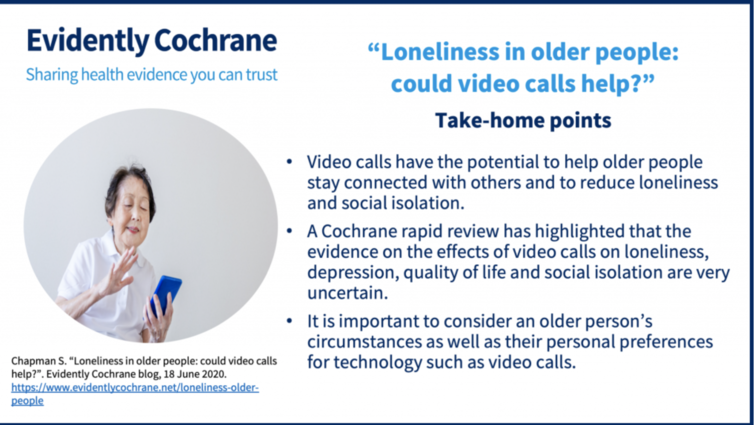Sarah Chapman looks at a Cochrane rapid review on whether video calls can reduce loneliness in older people, at a time when many people are still unable to have face-to-face contact with others due to the Covid19 pandemic.
“The best first-line antidepressant for older people is probably companionship.” This powerful statement from BMJ Learning, shared by a doctor on Twitter recently, got me thinking again about the extent to which companionship can be provided remotely, via our screens.
We’ve recently seen some easing of some of our lockdown restrictions and the arrival of another new phrase as we welcome ‘social bubbles’, which allow some single people (not those shielding) to join one other household for visits and stays. But for many people living alone this will not end their social isolation. To ‘bubble’ might be new but to be lonely is not and of course there are no easy answers to this widespread problem, pandemic or no pandemic.
Might video calls have an important part to play, particularly at the moment? As lockdown restrictions pushed lots of us into different ways of using technology, video calls may have felt like something of a lifeline for many as in-person visits to our homes and opportunities to meet elsewhere came to a sharp halt.
A Cochrane rapid review, one of several simplified systematic reviews done quickly to produce timely evidence for decision-making, aimed to assess the effectiveness of video calls for reducing social isolation and loneliness in older adults. The review also set out to explore the impact of video calls on depression and quality of life.
There were just three studies with a total of 201 people, comparing video calls to ‘usual care’ in nursing homes in Taiwan. None looked at social isolation. They each used scales to measure loneliness (the UCLA Loneliness Scale) and depression (the Geriatric Depression Scale), and one study measured quality of life, using a Taiwanese adaptation of the Short‐Form 36‐question health survey (SF‐36).
They found that:
- video calls may make little or no difference to scores on the UCLA Loneliness Scale compared to usual care at three months, but the evidence is very uncertain.
- video calls may have a small effect on symptoms of depression at one‐year follow‐up, but this evidence is also very uncertain.
- video calls may make little or no difference to quality of life, but the evidence is very uncertain.
Here’s an important consideration. The included studies did not specifically recruit people who were lonely or socially isolated. How are researchers going to show that the thing they are testing (video calls in this case) is having an effect on loneliness if the people taking part aren’t lonely? It’s a problem! Not a unique one either. Very sensibly, the review authors call for future research to involve older people who are demonstrably lonely and/or socially isolated at the start.

You can read the full paper HERE

